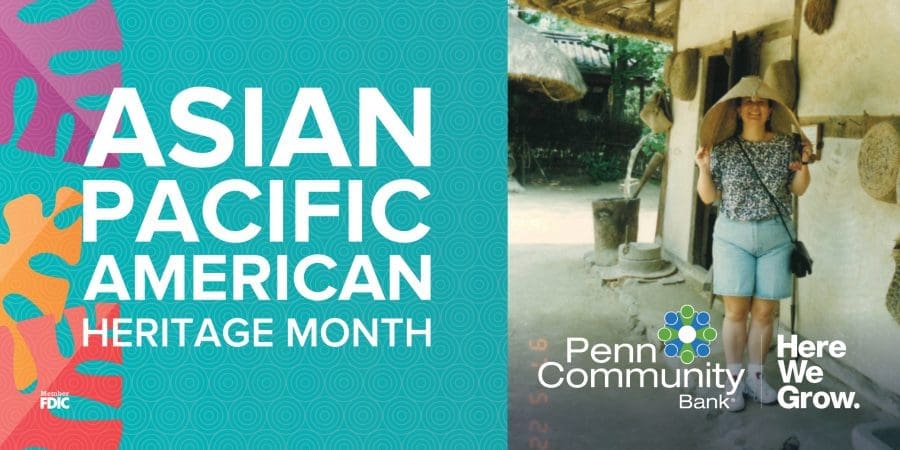
“Growing up, I was picked on for being the Chinese kid. I’m not even Chinese, I’m half-Korean half-Polish/American. Now, there’s an entire month dedicated to learning about my culture,” says Lynda Hoover.
The Penn Community Bank Riegelsville Financial Center Manager sat down with us recently to share her thoughts on Asian-America and Pacific Islander (AAPI) Month – a celebration of the impact of Asian Americans and Pacific Islander communities throughout our history.
Lynda is first-generation Korean American. Her father met her mother, a native Korean, while serving in the US Army in Inchon, Korea and married in 1966. They immigrated to the United States soon after, and sponsored her Korean family members to make the move to the United States, too.
Back then, everything that most Americans knew about Asian culture was based on wars and movies which led to challenges, Lynda says. Fast forward to now, having an entire month dedicated to learning about the diversity within the Asian culture is so valuable, she says. Being exposed to things online and being able to educate yourself on these topics helps, too.
Growing up, Lynda never planned to be a banker. Instead she earned her degrees in Public Relations and Music Business – ultimately landing in customer service, fundraising, and recruiting following graduation. Soon, however, she was longing for a career change and applied for a job as a teller at Penn Community Bank.
“Now, nearly 10 years later, I’m the Branch Manager at the same branch I started at as a teller,” says Lynda.
Everything Lynda knows about banking was through on-the-job training. She credits her Branch Manager at the time, Sue Matthias, for being an incredible mentor and teaching her to not just “pass the buck” and instead work with people through issues. When Sue retired last year, Lynda filled her role. From account opening and sales to customer financial education and problem solving, Lynda enjoys every facet of the job.
When you work in a variety of industries, it’s safe to say you gain a great amount of both work and life experience. For Lynda, though, one of her most impactful experiences was teaching conversational English in Korea.
“I kept seeing opportunities to teach English in Japan and thought, ‘If only I could do this in Korea instead and learn Korean to speak to my family!’” she recalls. When the opportunity presented itself, Lynda new she had to do it. So, off she went to Korea for a year.
When it comes to diversity, equity, and inclusion (DE&I) in the workplace, Lynda says it’s necessary pillar of a solid foundation. And to build that foundation, she says, you need to have a broad variety of perspectives and people. The best – and only – way to do that is to have a staff that can provide perspectives that you may not consider or even know of.
Working for an organization that understands the value of DE&I makes it all easier, Lynda says. It allows us team members to understand customers and coworkers in a different way and approach situations in a way that is welcoming and considerate of their needs.
“Being able to empathize with customers and their past experiences is important. It’s good to know when to say, ‘I haven’t gone through this in the past but I have an associate who has. Let me connect you with them,’” Lynda says.
Q&A with Lynda
How does DE&I play a role in customer relationships?
It gives me a great source of support for potential new hires and customers. I recently spoke with a local business that focuses on the LGBTQ+ community and told them that I was a member of the Bank’s LGBTQ+ employee resource group (ERG). They were excited to learn that Penn Community Bank has such a group available to employees. It helped me develop that connection and potentially get a new business customer as well.
What does Asian American Pacific Islander Heritage Month mean to you? What are you reflecting on?
This is a great time to learn about and showcase the diverse Asian community and cultures. Growing up, people only thought of “oriental” as being Chinese or Japanese because that’s what they were exposed to in history books and in movies. In the last few decades, people have learned that AAPI is a vast, diverse group of many cultures and societies. I’ve enjoyed the exposure that the AAPI community get on social media now and people’s willingness to listen and be educated about the culture. Growing up bi-racial (half-Korean half-Polish/American) was difficult, but that’s what taught me to be accepting of everyone. It’s not just people of different ethnicities, but different cultures, religious beliefs, traditions, and ways of life.
Is there any AAPI causes or organizations you’d like to spotlight?
The non-profit that I used to work for, Holt International Children’s Services, does international adoption and child welfare. Their main focus is family preservation and reunification, as long as it is in the best interest of the child. In the 1950s, the organization’s founders adopted 8 Korean War orphans (all at once) and were flooded with letters asking for their help to adopt a war orphan. Since then, Holt International has grown to work in over 16 countries and the US. To learn more, visit www.HoltInternational.org.




